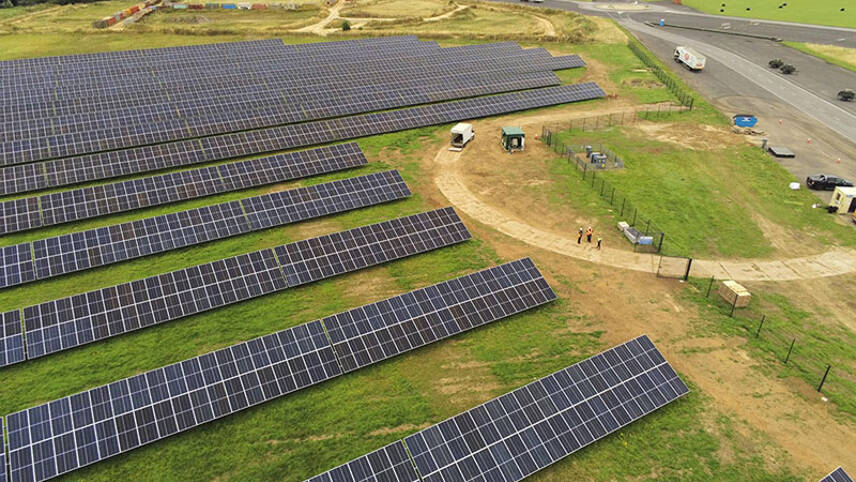Register for free and continue reading
Join our growing army of changemakers and get unlimited access to our premium content

Pictured: Solar at the The Defence School of Transport, Yorkshire. Image: © Crown Copyright
Members of the Defence Committee are urging the Ministry to set stronger targets to slash emissions and prepare for climate adaptation, following an inquiry where experts spoke of weak emissions measurement, poor target-setting and a lack of clear climate-related governance at the body.
The MOD has a 2025 target in place to reduce overall emissions by 30%, against a 2017-18 baseline. The inquiry concluded that this target is not demanding and could be delivered without any action from the MOD itself, purely due to the decarbonisation of the British electricity grid.
Far steeper emissions reductions could be made, the report states, by improving the energy efficiency of the MOD estate. The MOD also has major opportunities to scale self-generation of renewable energy and to install low-carbon technology options for heating and transport, the Committee’s report sets out.
All parts of the UK’s military are bound to the national 2050 net-zero target, except the RAF, which has set a more ambitious 2040 deadline. In the nearer-term, the Committee is calling on the MOD to set more challenging targets to slash emissions.
The Ministry will need to set out new near-term targets to cut emissions through to 2030 shortly, as part of the Greening Government Commitments workstream.
Defence Committee chair Tobias Ellwood, the Conservative MP for Bournemouth East, said: “A target that can be reached by the decarbonisation of the National Grid alone is simply not ambitious enough for the challenge we face. Sitting back and doing nothing cannot be a valid option for such a high-emitting area of Government. “
Underestimating emissions
A strong foundation for setting ambitious climate mitigation targets needs to be laid by improving emissions accounting, the Committee states.
The MOD did disclose an updated carbon footprint in its 2021-22 annual report. These figures were some 3.5 times higher than those originally reported and used to design the Greening Government Commitments through to 2025.
And, according to the Committee, these figures still cover only a minority of the total emissions likely resulting from UK defence across the world. MPs were told that the total could be near 13 million tonnes of CO2e, while reported figures at present are below 3.5 million tonnes of CO2e.
Sources of emissions missing from accounting at the moment include service family accommodation, fuel use , the destruction of nature in conflict, and post-conflict reconstruction.
Strategic approach
The Defence Committee is calling on the MOD to appoint a dedicated director for its climate efforts – a person with knowledge and experience, plus the capacity to dedicate their full-time working hours to coordinating decarbonisation and climate risk work.
Such a professional could develop a science-based transition plan and underlying workstreams. They would also ensure knowledge-sharing on climate between the different parts of the UK’s defence system.
An MOD spokesperson said “several” of the Defence Committee’s recommendations “align with work already being undertaken”. A full response will be published soon but no set date has been given.
Ellwood concluded: “The RAF’s committed target – intending to decarbonise a full decade before the Government’s deadline – proves that net-zero ambition exists within Defence. But it is vital for the MOD to march as one, with coordination across the Services and teams. This is one of the many reasons why we recommend the MOD create a dedicated climate change director, who is able to give full focus to this critical task.“
The other MPs on the Defence Committee are Sarah Atherto (Conservative), Robert Courts (Conservative), Dave Doogan (SNP), Richard Drax (Conservative), Mark Francois (Conservative), Kevan Jones (Labour), Gavin Robinson (DUP), John Spellar (Labour) and Derek Twigg (Labour).


‘Twas ever thus!